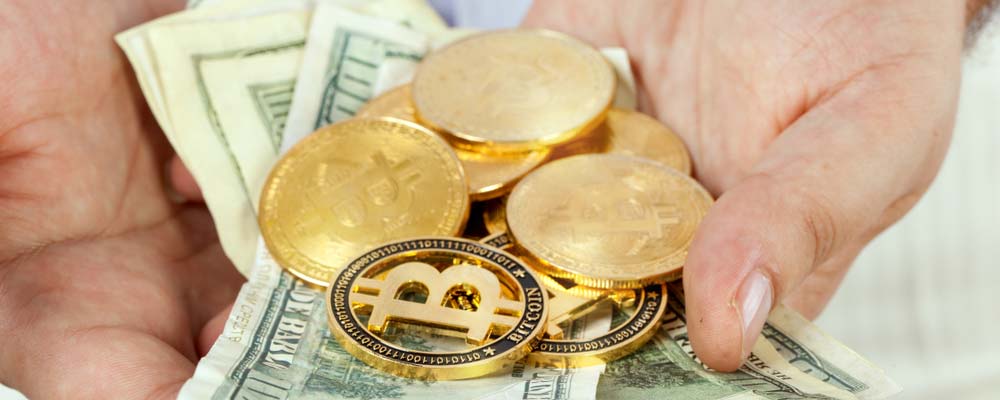“I still think it’s all a scam.”
A little blue bubble came in through my phone. I laughed. It was a text from a friend I’d made during my recent trip to New York.
Trent worked as a software engineer at a bustling magazine up there, so we had plenty to talk about. But the debate we kept coming back to — the one he was referencing in his text — surrounded none other than blockchain technology.
He didn’t see much practicality in it. He was a skeptic through and through, claiming the current buzz around the industry was just that … a buzz.
“Blockchain is just a great tool for niche applications,” read one of his texts.
And I … well, I tried to see his point.
But I admit, it was difficult. I work with people like cryptocurrency trader Ian King and disruptive tech expert Paul . Both have their own unique takes on blockchain, but they both see enormous possibilities for the platform.
Even better, they see incredible returns for traders who get into the industry now. After all, experts project the industry will soar 77,400% as it explodes from a $4 billion market to a $3.1 trillion one.
Clearly, they see the practicality.
Now, for those who don’t know much about blockchain, an IBM report explains it well:
Blockchain is a shared, distributed ledger that facilitates the process of recording transactions and tracking assets in a business network. An asset can be tangible — a house, a car, cash, land — or intangible, like intellectual property, such as patents, copyrights or branding. Virtually anything of value can be tracked and traded on a blockchain network, reducing risk and cutting costs for all involved.
Keep in mind: Once a transaction is locked into the blockchain … no one can change it. It’s locked into every computer in the network at the same time, completing a permanent, unalterable digital record.
Now that’s a system of decentralized trust you can’t truly get, from say, your bank.
In fact, this technology has the ability to disrupt every industry on the planet, including:
Health care: $8.7 trillion. Take Shivom, for example, the genomics and precision medicine company. Shivrom just created a “unique global genome ID” designed to give patients secure ownership of their genomic information … using blockchain.
Automobiles: $2 trillion. In a recent instance, General Motors helped launch the Mobility Open Blockchain Initiative, a nonprofit project that focuses on bringing auto manufacturers and governments together to accelerate blockchain adoption. The idea is to use it to make the industry greener, more accessible and much more streamlined. Blockchain could be used to maintain an immutable record of vehicle IDs and history, for example.
Insurance: $4.5 trillion. Information technology solution provider Accenture just partnered with RiskBlock Alliance, a blockchain association comprised of insurance leaders such as Chubb, Marsh and Liberty Mutual. Together, their plan is to find a way to use blockchain and distributed ledger technology to improve the industry.
Banking: $134 trillion. Veerathai Santiprabhob, governor of the Bank of Thailand, just announced it’s reviewing blockchain applications that would help in document authentication, supply chain financing and cross-border payments.
Shipping: $8.1 trillion. A few years ago, the United Nations Economic and Social Commission for Asia and the Pacific reported that going paperless could increase exports by $257 billion annually worldwide, while reducing the average exporting time by 24% to 44%. Meanwhile, the cost of shipping would fall 17% to 31%. That’s why shipping giants like Maersk are exploring blockchain options.
Real estate: $217 trillion. Earlier this summer, New York’s Bapple Realty became the first real estate company to broker a commission split using blockchain technology. The seller divvied up a $3,400 commission — paid in Ethereum tokens — to easily pay the brokerage and the agents involved.
From real estate to banking to health care, and from shipping to insurance to automobiles … nearly $400 trillion in various industries is set to be forever transformed by blockchain.
And that’s just what I told my friend Trent. I even sent him this video Paul just recorded about why he just bought his first cryptocurrency.
I haven’t heard a response back, but I think Trent is starting to warm up to the idea. We may have another blockchain convert yet!
After all, the numbers speak for themselves.
Now, if you’re interested in profiting from this industry, I suggest getting in soon before the industry explodes 77,400% higher.
Regards,

Jessica Cohn-Kleinberg
Managing Editor, Banyan Hill Publishing
Editor’s Note: In over 25 years on Wall Street, Paul has made millions, even billions, of dollars for the firms he’s worked for. And he’s never been more confident than he is now that blockchain will spawn more millionaires than any event in stock market history. That’s why you need to take action today —and not sit by idly, letting this rare opportunity to build generational wealth pass you by. To watch Paul’s brand-new video about this revolutionary new technology, click here.




